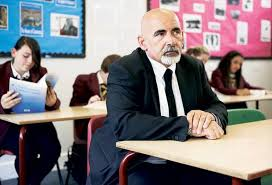Feeling tired and run down? Remind yourself why you came into the job in the first place. Below is an excert from an excellent BLOG http://headguruteacher.com/2013/12/20/10-reasons-to-love-teaching/
1. Doing the things you love while you’re at work
It has always struck me as remarkable and fortuitous that I am paid to do a job where I get to have so much fun. In my lessons, I have the chance to explore my favourite subject – Physics. Today I was talking about space, time and gravity with my Y13s; on Monday I took my Y9s outside to make a scale model of the solar system on the field. I had as much fun as anyone. Earlier, my colleagues were getting excited that our Cosmic Ray Detector, built over several years from scratch, was sparking nicely. Teaching is full of those moments – if you create them.
But it’s not just the joy of teaching your subject specialism – you can do all kinds of other things: play in the orchestra, watch or direct a drama production, go on school trips around the UK and around the world, coach a sports team; get involved in debates; run a Model United Nations; set up a club where students help you do something you want to do – make videos, create a garden, keep chickens, build a go-cart; go on camping expeditions for DofE. And so on. What other job is like that, affording so many opportunities to engage in your passions and to share them with other people.
2. Making a difference: Knowing it’s the most important job
As Chris Husbands, Director of the IoE, said to my students today, education is to the 21st C what oil was to the 20th C and coal was to the industrial revolution. We’re in the business of giving young people the greatest asset in the world economy. We’re doing the thing that transforms lives. It’s a big deal – which is why we spend so much time talking about how to get it right. But, across the wide landscape of careers, this is the ONE. You’re in the right place people. Be happy.
3. Young People are Wonderful
Today, students who finished their A levels in June came back for Prize Giving after a term at university. It was wonderful to talk to them…people I knew as 12-year olds, now adults living their lives, already with many tales to tell. My Year 9s can frustrate me – gosh, they like to talk! But they amaze me in equal measure – so many ideas, so curious about the world and always looking for a channel for their enthusiasm and joie de vivre. These are the people that make it all worthwhile; each one a unique personality with different attitudes and ways of thinking, bursting with possibilities for the future. The relationships you can form with your students as you strive together to maximise their learning are quite wonderful.
We may feel we’re teachers of a subject – but we’re not; we’re teachers of students learning our subject. It’s really all about them – and that’s the joy.
4. Local Community; Global Community
Schools are great places aren’t they? I love that sense of being part of something; belonging to a group of people with a shared sense of purpose; a common identity and common challenges. When you are a teacher, you are part of a much bigger project – there’s a vision for reaching audacious goals where you need to play your part. At their best, schools are giant families, offering that sense of togetherness and mutual support. We’re all in it together.
At the same time, and increasingly as social media links us all up, we’re all part of a much wider community as teachers. I love the idea of being engaged in a global profession. People are doing what I do in every town and village across the world. Even just within the UK, it’s exciting to think of all the connections we can make with other people doing the same job we do…sharing ideas, working together to improve the whole system, not just our tiny patch of it.
5. The rewards of achievement
School life has a routine for sure… but then it is punctuated with moments of pure joy. These are often when a student makes a break-through. “John, YES – that’s it – brilliant! Say that again…” “You see.. you CAN do it. That’s a really good answer; great piece of drawing; excellent analysis; well crafted paragraph; insightful essay”. These are the great moments…watching a student struggle and then to emerge with a clear grasp of an idea. At Prize Giving today, this struck me. It wasn’t the book; or the cup, medal or certificate – it was just the reward of having achieved that meant the most to them. Not many jobs give you the opportunity so witness achievement on a daily basis in that way.
6. Every Day is Different
There is never a dull moment in teaching …something is always going on. Of course, there are tough days…it’s a challenging job, just as any worthwhile job should be. But no two days are the same – especially if you teach so that every lesson is a bit of a journey into the unknown. The lessons, events, incidents and interactions with colleagues, students and parents that make up the week demand such a wide range of skills, engaging different modes of thinking: being strategic and planning ahead, analysing problems and finding solutions, being agile and responsive to questions and situations; and, very often, running through a range of emotions, from laughing to crying…it’s all in a day’s work.
7. Strategic challenges and leadership opportunities
Schools are fabulously complicated and challenging organisations. I’ve always found the intellectual and personal challenge of running a great lesson, a year group, a department or a school, incredibly rewarding. There are so many opportunities to lead people, organise events or projects and to put ideas into action. Given the complexity and importance of learning, I can’t think of a profession where strategic analysis and interpersonal dynamics mix in such a fascinating way. Teaching should be the No1 graduate profession; this is where the action is.
8. Being your own boss; creating your own space
Of course we all have things we have to do that we’d rather not. But teaching affords a fantastic degree of autonomy. If you choose, teaching can have an strong element of performance about it…you’re on stage, live and in the room with 9M; you can express yourself in a way that you never do around adults. Or, you can be quietly cerebral, wildly eccentric or straightforward and dignified. The classroom is your domain…your space to make things happen the way you want them to. Every lesson is yours to craft, the way you want it…testing out ideas, exploring off at tangents or just keeping it simple. I love that.
9. Learning, always learning
A teaching career is a never-ending learning journey. You learn more and more about your subject, you learn new skills continually as you engage in new ideas about pedagogy; you develop a broad perspective on social issues and the range of personal challenges people face…the learning goes on and on. You learn a lot about yourself and how your ethical and political dispositions fit with real-life challenges. You learn how to deal with people in every conceivable emotional state; you learn how to communicate a message and how to turn ideas into action.
Teaching IS learning.
10. The Holidays
I’m not being facetious. Teaching is incredibly rewarding but also incredibly demanding. But then the holidays come and we deserve them. Generally, teaching is a great job to be in to have a family, to have time for yourself and to have blocks of time to go travelling and to do other interesting things. I never take the bait when my non-teaching friends have a dig because they’re working during half-term or just get a few days at Christmas. Not everyone wants to teach; not everybody could. But those who do, deserve every minute of the holidays.







